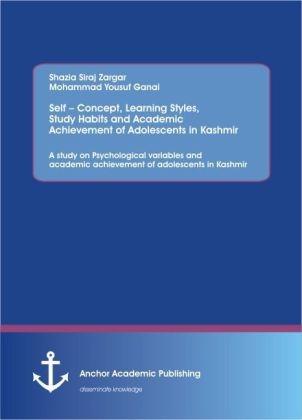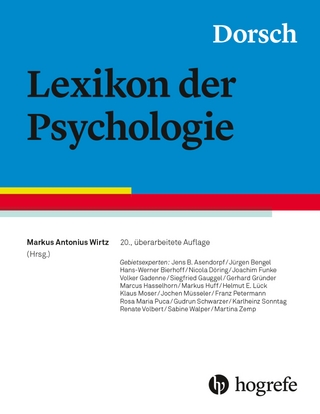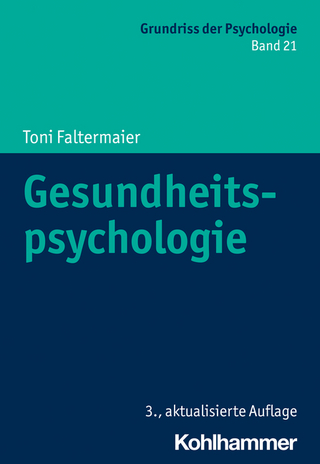
Self ¿ Concept, Learning Styles, Study Habits and Academic Achievement of Adolescents in Kashmir: A study on Psychological variables and academic achievement of adolescents in Kashmir
Anchor Academic Publishing (Verlag)
978-3-95489-210-5 (ISBN)
Dr. Shazia Siraj born in Saraf Kadal Srinagar in the year 1984. Dr. Shazia Siraj has completed her M.A., B. Ed. Med with Ist division from Kashmir University. The author has completed her M. Phil, with Grade A from the same University. She also holds PhD Degree. The author started her career as assistant Professor in the Sarafraz college of Education and Trainings in the year 2009 and worked there for three years. Presently assistant Professor in Amar Singh College. The author has published 12 research papers on both national and International level in the leading Journals. The author has also teaching experience as a resource person in the Directorate of Distance Education University of Kashmir and IGNOU. The author has also attended ten days seminar conducted by P. G. Department of Education University of Kashmir.
CHAPTER 1: Introduction:
The latest concept about the influences exerted on the child starts right from the neonatal stage. This is an established fact that outer environment plays a dominant role in the formation of the body and the make-up of neonate s mind. However, at later stage a person, to some extent, shapes the pattern of his life by the choices and decisions he makes at successive stages of life. The choice and decisions taken are usually based on the inputs that he/she has received during the preceding years, be it from family, peers or school. So far as the school influence is concerned a teacher assumes pivotal position. A teacher s main concern in the classroom is all-round development of the child. It is a time tested adage as is the teacher so is the taught and as is the taught so is the society. A teacher dedicated in educating a child in a balanced and integrated manner has to understand the characteristics, proclivity of a child at various stages of life. Therefore, it is essential for a teacher to study the growth and development of different stages of life.
Growth refers to quantitative changes in physical development, i.e. increase in size, height and weight. Growth refers to the structural and physiological changes, i.e. growth in height and weight or it may be change in the particular aspects of the body or some part of the body. The term development refers to change in structure, form or shape and improvement in functioning. When qualitative changes occur in behavioral characteristics of the child, it is called development. Development means the whole sequence of life from conception to death. It may imply the change in the organism as a whole. Hurlock says that it is progressive series of changes in an orderly coherent pattern . The changes are directional leading to vertical and horizontal mobility and resulting in new characteristics and new abilities on the part of the individual. Development is comprehensive which includes physical, social, and emotional and many more aspects of an individual. With the onset of adolescence, physiological changes accelerate, sexual maturity arrives, social relationships become more intense and new cognitive capacities emerge. Although psychological maturity does not occur so rapidly because teenage is a stage of transition accelerated by development. When we speak of the adolescent as growing up, we mean that the youth has left behind the phase of protective childhood and is becoming independent, capable of going out to fend for him/her.
Early adolescence extends roughly from 13-16 and late adolescence covers the period from 16 until 18, the age of legal maturity. Adolescent is the most crucial period in the life of a human being. It is the stage when the surge of life reaches to its highest peak. The adolescent s life is, or might be, full of hopes. The adolescents are eager to interact with new experiences, to find new relationships, to examine resources of inner strength and fathom the strength of their inner abilities. The adolescent tries to have freedom to think and set his own goals and discover means to achieve them. Adolescence is considered as a transitional phase, a status passage between childhood and adulthood (Fend, 2000; Flammer and Alsaker, 2002; Hurrelmann, Rosewitz and Wolf, 1994; Maggs, Schulenberg and Hurrelmann, 1997). In this transition phase, bodily, emotional, and social changes occur and these changes fully occupy the attention of the adolescents. The main questions that are stated to the self are concentrated on emotions ( How am I? ), social development ( What am I able to do? ), and identity ( Who am I? ). The adolescent way of thinking is rather egocentric (Elkind, 1978) and adolescents are quite concerned about their appearance, their impression on others, and their abilities. Also, they tend to feel that they are the focus of attention of others. Development of Self is an important phase of this stage. It refers to the image w
| Sprache | englisch |
|---|---|
| Maße | 155 x 220 mm |
| Gewicht | 300 g |
| Themenwelt | Geisteswissenschaften ► Psychologie ► Allgemeines / Lexika |
| ISBN-10 | 3-95489-210-3 / 3954892103 |
| ISBN-13 | 978-3-95489-210-5 / 9783954892105 |
| Zustand | Neuware |
| Haben Sie eine Frage zum Produkt? |
aus dem Bereich


